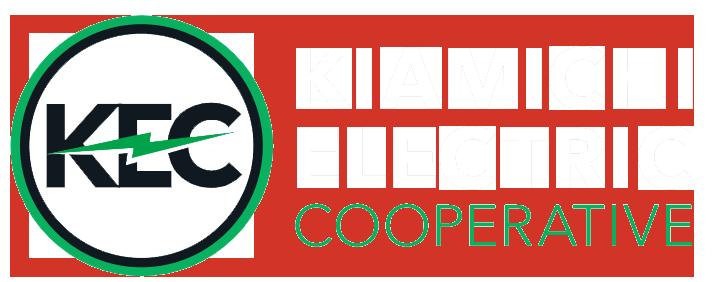Storms rip through KEC’s service area in June

Kiamichi Electric Cooperative (KEC) completed power restoration efforts following extremely high winds that tore through Oklahoma in June.



The storms initially knocked out power to over 6,000 KEC members. KEC and contractor crews worked to restore power and rebuild 29 poles that were destroyed.

“We appreciate our members’ patience
and understanding as we restored power,” said CEO Brett Orme. “Our line crews worked nearly aroundthe-clock to ensure power was restored as quickly as possible.”
2 From our CEO: Factors that impact energy costs

3
Four key factors that impact your energy bills
4

We appreciate our members’ patience and understanding as we restored power.
— CEO BRETT ORMEBrett Orme General Manager
944 SW Highway 2
PO Box 340
Wilburton, Oklahoma 74578
(918) 465-2338 | (800) 888-2731
BOARD OF DIRECTORS
Ron Pelanconi, President
DISTRICT 3
Russell Shaw, Vice President DISTRICT 1
Amy Miller, Treasurer DISTRICT 2
David Ray DISTRICT 4
Don Parr DISTRICT 5
Mark Ichord
DISTRICT 6
Larry Culwell DISTRICT 7
KEC SENIOR STAFF
Brett Orme EXECUTIVE VICE PRESIDENT — CEO

Linda Baldwin
EXECUTIVE ASSISTANT
Crystal Butler
CHIEF FINANCIAL OFFICER
Dennis Dolan MANAGER OF OPERATIONS
Andy Eakle MANAGER OF ENGINEERING
Sharla Ivy MANAGER OF PROCUREMENT
Michelle Warmuth MANAGER OF MEMBER & PUBLIC RELATIONS
Heather Ziverk MANAGER OF MEMBER SERVICES
I was recently asked about what impacts electricity prices. We talked about how the daily cost of living seems to have increased across the board.
Just as inflation has impacted everything from the price of gasoline to the price of eggs, costs required to produce electricity have also risen. This is a timely topic, so I wanted to help explain some of the factors that impact electricity prices (and energy bills) in this month’s issue of The Light Post.
While there is no short answer, there are a few key elements that impact electricity prices and rates. Some of these factors KEC can manage, some of them you can impact and other factors are beyond our control. So, let me break it down.
There are three primary parts to your monthly electric bill: a service availability fee, a kWh charge and a power cost adjustment (PCA). To understand your total energy costs and what impacts your bill, lets unpack one piece at a time.
The first is a fixed monthly service charge, which covers the costs associated with providing electricity to your home. This includes equipment, materials, labor and operating costs necessary to serve each meter in KEC’s service territory, regardless of the amount of energy used. In order to ensure the reliable service you expect and deserve, we must maintain the local system, including power lines, substations and other necessary equipment. Like many other businesses, we’ve experienced supply chain issues and steep cost increases for some of our basic equipment. Because we
are a not-for-profit cooperative, some of these expenses must be passed on to our members. I should note that the service availability fee is the same for everyone and the costs are shared equally across the membership.

Another component of your monthly bill is the kWh charge, which covers how much energy you consume. You’ve likely noticed the amount of energy you use can vary from month to month and is typically impacted by extreme temperatures. When temperatures soar or dip, your cooling and heating equipment run longer, which increases your home energy use. Regardless, energy consumption is an area that you have some control over, and you can lower your monthly bill by actively reducing energy use.
The last component of your bill is the PCA, or Power Cost Adjustment. You might notice the PCA fluctuating because of higher natural gas prices, which means the power that KEC purchases from our wholesale provider is more expensive. The PCA covers these fluctuations without having to continually restructure electricity rates.
I hope this information sheds light on some of the factors that impact electricity prices. While we can’t control the weather or the rising costs, please know KEC is doing everything possible to keep internal costs down.
We’re here to help you, too. Contact us if you have questions about your energy bill or for advice on how to save energy at home.
1.
KEY FACTORS Impact Energy Bills
for the electricity you consume each month, but additional factors that impact your energy bills.
1. Fuel Costs
4 KEY FACTORS That Impact Energy Bills
You pay for the electricity you consume each month, but there are additional factors that impact your energy bills.
power plant or from a renewable source. The cost of fuels used to generate electricity fluctuates, which is why you see a power or fuel charge on your monthly bill. This monthly charge covers cost fluctuations without having to continually restructure electricity rates.
Four Key Factors that Impact Your Energy Bills
Energy Efficiency Tip of the Month
You


KEY FACTORS Impact Energy Bills
for the electricity you consume each month, but additional factors that impact your energy bills.
Before electricity can be delivered to your home, it must first be generated at a power plant or from a renewable source. The cost of fuels used to generate electricity fluctuates, which is why you see a power or fuel charge on your monthly bill. This monthly charge covers cost fluctuations without having to continually restructure electricity rates.
1.
Fuel Costs
2. Service Costs
Your bill includes a monthly service charge, which recovers part of the co-op’s ongoing investments in poles, wire, meters, system maintenance and additional costs necessary to provide electric service.
Before electricity can be delivered to your home, it must first be generated at a power plant or from a renewable source. The cost of fuels used to generate electricity fluctuates, which is why you see a power or fuel charge on your monthly bill. This monthly charge covers cost fluctuations without having to continually restructure electricity rates.
1. Fuel Costs
2. Service Costs
Your bill includes a monthly service charge, which recovers part of the co-op’s ongoing investments in poles, wire, meters, system maintenance and additional costs necessary to provide electric service.
Before electricity can be delivered to your home, it must first be generated at a power plant or from a renewable source. The cost of fuels used to generate electricity fluctuates, which is why you see a power or fuel charge on your monthly bill. This monthly charge covers cost fluctuations without having to continually restructure electricity rates.
3. Weather
2. Service Costs


3. Weather
2.
Service Costs
Your bill includes a monthly service charge, which recovers part of the co-op’s ongoing investments in poles, wire, meters, system maintenance and additional costs necessary to provide electric service.
When temperatures soar or dip, your cooling or heating equipment must run longer and at maximum capacity, which can greatly increase your energy use. Extreme temperatures can also a ect electricity market prices. When the need for electricity increases due to extreme heat or cold, the price of power typically rises.
Your bill includes a monthly service charge, which recovers part of the co-op’s ongoing investments in poles, wire, meters, system maintenance and additional costs necessary to provide electric service.
When temperatures soar or dip, your cooling or heating equipment must run longer and at maximum capacity, which can greatly increase your energy use. Extreme temperatures can also a ect electricity market prices. When the need for electricity increases due to extreme heat or cold, the price of power typically rises.
3. Weather
4. Energy Consumption
When temperatures soar or dip, your cooling or heating equipment must run longer and at maximum capacity, which can greatly increase your energy use. Extreme temperatures can also a ect electricity market prices. When the need for electricity increases due to extreme heat or cold, the price of power typically rises.
This is the amount of electricity you use each month to power your home’s cooling/heating system, appliances, lighting, electronics and more. The amount of electricity you consume is measured in kilowatt-hours, or kWh. You have control over how much energy you use, which can ultimately help manage your monthly costs.
4. Energy Consumption
This is the amount of electricity you use each month to power your home’s cooling/heating system, appliances, lighting, electronics and more.
The amount of electricity you consume is measured in kilowatt-hours, or kWh. You have control over how much energy you use, which can ultimately help manage your monthly costs.
3. Weather
4. Energy Consumption
When temperatures soar or dip, your cooling or heating equipment must run longer and at maximum capacity, which can greatly increase your energy use. Extreme temperatures can also a ect electricity market prices. When the need for electricity increases due to extreme heat or cold, the price of power typically rises.

This is the amount of electricity you use each month to power your home’s cooling/heating system, appliances, lighting, electronics and more. The amount of electricity you consume is measured in kilowatt-hours, or kWh. You have control over how much energy you use, which can ultimately help manage your monthly costs.
4. Energy Consumption
This is the amount of electricity you use each month to power your home’s
Did you know ceiling fans can make a room feel 4 degrees cooler? To save energy through ceiling fan use, remember to raise your thermostat a few degrees while fans are turned on. Ceiling fans can help improve comfort year-round. In the summer, operate ceiling fans in a counterclockwise direction. Reverse the direction to clockwise during winter months and set fans on a low speed so warm air can circulate from the ceiling to the lower levels of the room.
Remember, ceiling fans cool people, not spaces. Be sure to turn them off when you leave the room.
Source: Dept. of Energy
pay for the electricity you consume each month, but there are additional factors that impact your energy bills.
MONTHLY UPDATE operation
round up
Operation Round Up® is a voluntary bill roundup program that benefits local communities, organizations ,and needy families. Funding applications are available at Kiamichi Electric, local social services, or online at www.kiamichielectric.org.
YEAR-TO-DATE COLLECTIONS: $24,977.27



TOTAL DISBURSEMENTS SINCE INCEPTION: $1,775,670.00
TOTAL COLLECTED SINCE INCEPTION: $1,863,154.67
Renewables Report

Tuscan Cream Cheese Spread
INGREDIENTS
• 2 (8 ounce) packages cream cheese, softened
• 2 teaspoons chopped garlic
• 1 teaspoon salt
• 1 (14 ounce) can artichoke hearts, drained and chopped
• 1/3 cup chopped black olives
DIRECTIONS
• 8 green onions, chopped
• 3 ounces sun-dried tomatoes, softened and chopped
• ¼ cup chopped parsley
• 1 tablespoon chopped fresh chives
In a medium bowl, mix cream cheese, garlic and salt; stir and blend in artichoke hearts and olives.
Add green onions, tomatoes, parsley and chives; gently mix together.
Refrigerate for several hours or overnight to blend flavors; serve.
Recipe and photo from AllRecipes.com
 Data collected from Western Farmers Electric Cooperative — KEC’s wholesale power provider — reflects generation during April 2023, which shows 35 percent of the power generated by WFEC potentially come from renewable sources.
Data collected from Western Farmers Electric Cooperative — KEC’s wholesale power provider — reflects generation during April 2023, which shows 35 percent of the power generated by WFEC potentially come from renewable sources.
